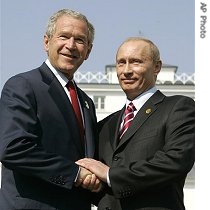2007年VOA标准英语-US-Russian Relations Remain Strained(在线收听)
Washington, DC
15 June 2007
The once promising relationship between the U.S. and Russia is now more prickly. The strain between the remaining superpower and its former Cold War foe was evident in statements by the two nations' leaders last week. Then at the G-8 summit in Germany, Russia broke the tension somewhat when President Vladimir Putin offered to join the U.S. in a missile defense system.
George Bush and Vladimir Putin appeared relaxed and personally friendly. Even in the midst of missile diplomacy, they could still joke.

President Bush, (l), shakes hands with Russian President Vladimir Putin after their meeting in Heiligendamm, Germany, 07 Jun 2007
But the once easy relationship is tested these days by a Cold War-style dispute over missiles in Europe and by the Putin government's increasing control over Russian society.
After their first meeting six years ago in Slovenia, Mr. Bush saw in his Russian counterpart a man he said he could trust. "I looked the man in the eye," said President Bush in 2001. "I found him to be very straightforward and trustworthy. I was able to get a sense of his soul."
But the chairman of the House Foreign Affairs Committee says the two leaders' hoped for love affair has fizzled. "The president no longer looks into Mr. Putin's eyes and sees a fellow soul who is committed to free and open democratic societies," said Democratic Party CongressmanTom Lantos.
In Russia, anti-government protests are now common. Protesters complain of the Kremlin's suppression of civil liberties, crackdown on press freedoms and the war against Chechen separatists.
President Bush says, “America can maintain a friendship and push a nation toward democracy at the same time."
Last week in the Czech Republic, President Bush was open in his criticism of Mr. Putin's government. "In Russia, reforms that were once promised to empower citizens have been derailed with troubling implications for democratic development," he said.
"I think it was a tragic thing for him to say," noted Scholar Irina Papkova of the Kennan Institute in Washington, D.C. It is easy to dismiss Mr. Bush's criticism. She cites Russia's improving economy and Mr. Putin's wide popular approval rating.
She compares that to Mr. Bush's handling of the war in Iraq and terror suspects. "So, I think in that sense, President Bush's statements are only reinforcing the tendency in Russia to say: 'Who are they to tell us how to run our lives?'"
Two weeks ago President Putin threatened to aim nuclear missiles at Europe. Russian officials say the U.S. proposal to place an anti-missile radar in the Czech Republican and 10 interceptor rockets in Poland could undermine Russia's nuclear deterrent.
But then Mr. Putin, in a surprise move, proposed a radar site in Azerbaijan aimed solely at detecting Iranian missiles. "This will make it possible for us not to change our stance on targeting our missiles," said President Putin. Mr. Bush said the U.S. would consider the proposal.
Former U.S. Assistant Secretary of State Richard Holbrooke says the missile dispute exposes badly strained relations. "The two governments are not in good communication right now," he said. "There's a lot of anger on each side, and it is not a Cold War, but we have got to work together as we did in the 1990s."
Before Mr. Putin's presidency, Russia struggled to emerge from the economic mismanagement of the Soviet years. But in the Putin years, Russia's economy has grown steadily.
"Over the last few years, Russia has become a much stronger economic power," noted Foreign policy research analyst Igor Danchenko. "It is much more confident, and so it is now trying to pursue a more independent foreign policy."
Russian foreign policy interests diverge from the U.S. on the future of Kosovo, on the war in Iraq and relations toward Iran. Yet the nation's two leaders still have close ties.
“President Bush maintains a great relationship with Putin," added Danchenko. "He knows that he needs Vladimir Putin to get what the United States wants in its foreign policy objectives, and President Putin recognizes the importance of U.S.-Russian relations."
The Bush administration once regarded this as an new era of positive cooperation with Russia. Indeed, talks at the G-8 summit were cordial. And Mr. Putin's gambit on missile defense will result in more discussions with the U.S. this summer. Yet experts say Russia will continue to flex its muscles from a position of newfound economic strength.